1. Installation of Ansible
epel source
dnf install ansible -y
ansible --viersion
Basic information of ansible:
/etc/ansible/ansible.conf ## Global configuration file, rarely modified by default
/etc/ansible/hosts ## Global host manifest file
dnf install sshpass-1.06-9.el8.x86_64.rpm -y dnf install ansible-2.9.11-1.el8.noarch.rpm -y

2. Secret free connection between main control computer and controlled computer
[root@ansible111 ~]# ssh-keygen
[root@ansible111 ~]# dnf install expect -y
[root@ansible111 mnt]# cat sshkey.sh
#!/bin/bash
AUTOSSH()
{
/usr/bin/expect << EOF
spawn ssh-copy-id -i /root/.ssh/id_rsa.pub root@172.25.254.$i
expect {
"yes/no" { send "yes\r";exp_continue }
"password" { send "westos\r" }
}
expect eof
EOF
}
for i in 211 210
do
AUTOSSH
done
[root@ansible111 mnt]# sh sshkey.sh
[root@ansible111 mnt]# ssh -l root 172.25.254.210 ##You can log in directly without secret3. Build Anisble list
Listing is a list of ansible control hosts
/etc/ansible/hosts ## Global manifest file
1. Write the managed host name or ip directly, one per line
node1.westos.com
node2.westos.com
172.25.254.240
2. Set the Group [group name] of the managed host
#List view:
Group name in ansible manifest [- i manifest file] -- list-hosts
ansible ungrouped --list-hosts
ansible all --list-hosts
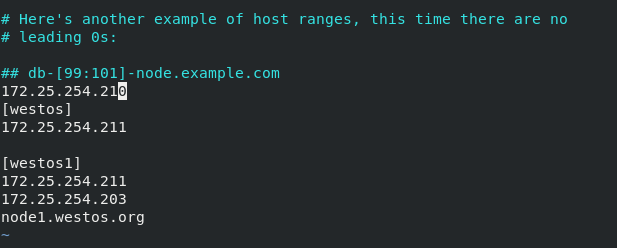
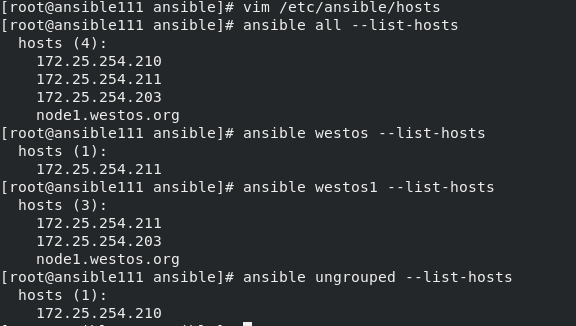
Single layer list
[list1]
node1.westos.com
node2.westos.com
[list2]
node2.westos.com
[list3]
172.25.254.240
Nested list
[westos:children]
list1
list3
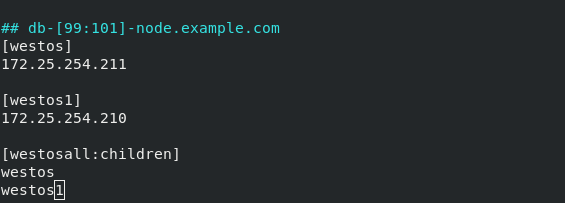

3. Scope operation of host specifications
#The Ansible host list can be simplified by specifying the host name or IP range
#Syntax:
#[start:end]
[westostest]
172.25.254.[100:108]

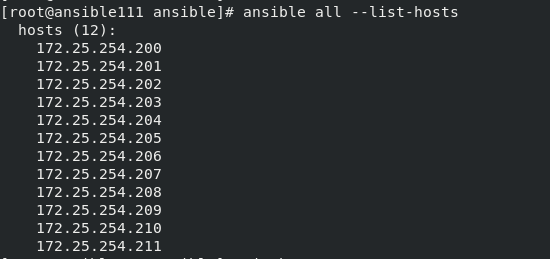
4. Specify other inventory documents
vim inventory
172.25.254.240
[westostest]
172.25.254.100
172.25.254.200
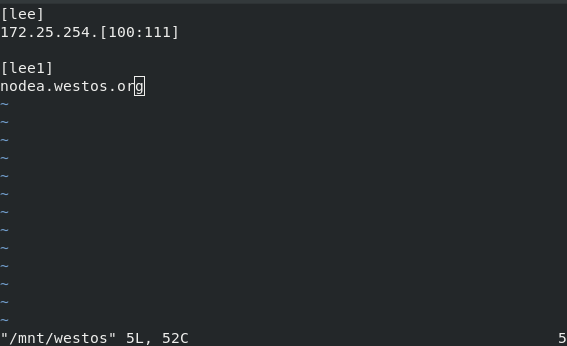
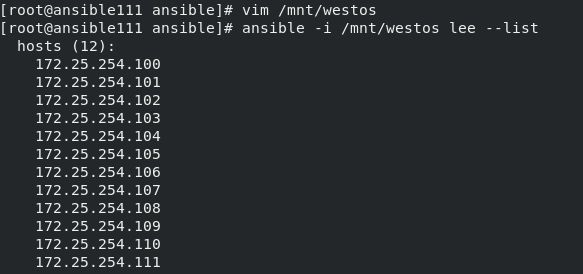
The ansible command specifies the regular expression of the manifest
* ## All
##172.25.254.*
##westos*
: ## Logical or
##westos1:linux
##172.25.254.100:172.25.254.200
:& ## Logic and
##westos1:&linux
## The host is in both the westos1 list and the linux list
:! ## Logical non
##westos1:!linux
## In westos1, not in linux
~ ## Start with keyword
~(str1|str2) ## Start with condition 1 or condition 2
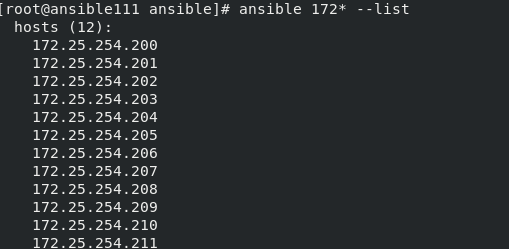
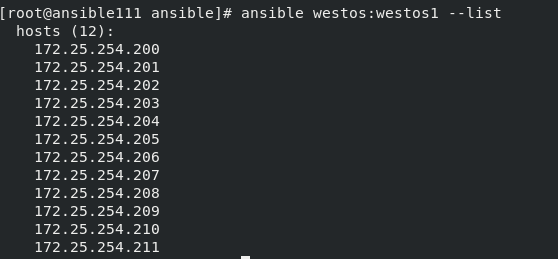
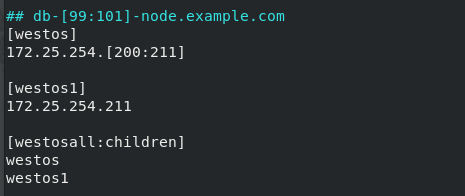
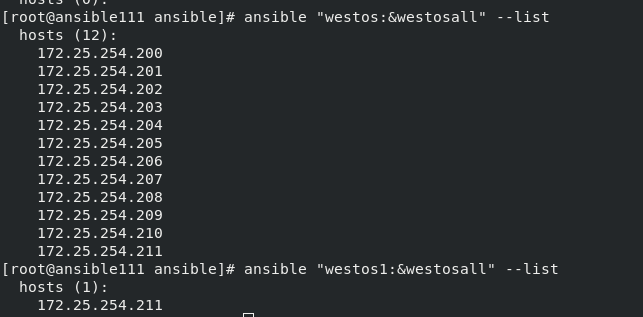
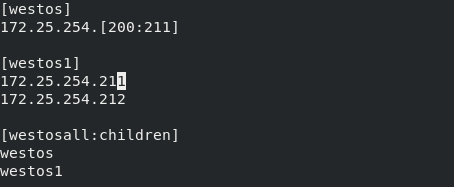

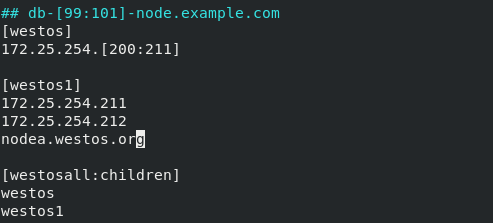
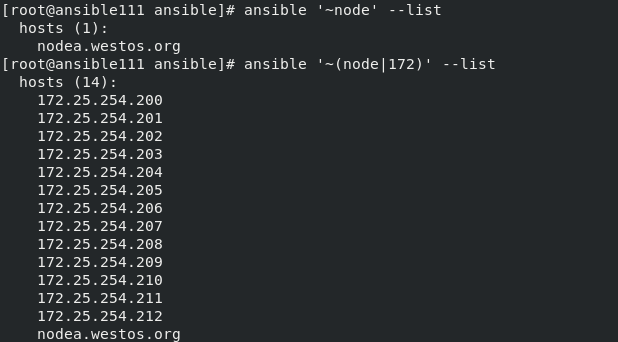
4. Detailed explanation of Ansible configuration file parameters
Group name in ansible list - m module - u remote_user
1. Classification and priority of configuration files
etc/ansible/ansible.cfg # Basic configuration file, no other configuration file found. This file takes effect
~/.ansible.cfg # The user does not have ansible.cfg in the current directory. This file takes effect
./ansible.cfg # Highest priority
2. Common configuration parameters
#[default] ## Basic information setting
inventory= ## Specify manifest path
remote_user= ## The user name logged in on the managed host. The current user is not specified
ask_pass= ## Whether to prompt for SSH password. If public key login is set to false
library= ## Storage directory of library files
local_tmp= ## Local temporary command execution directory
remote_tmp= ## Remote host temporary py command file storage directory
forks= ## Default concurrency
host_key_checking= ## Do you want to enter yes to establish the host when connecting to the managed host for the first time_ key
sudo_user= ## Default sudo user
ask_sudo_pass= ## Whether to ask sudo password every time the controlled host executes the ansible command
module_name= ## The default module uses command by default and can be modified to shell
log_path= ## log file path
[privilege_escalation] ## Identity information setting
become= ## Whether to automatically switch users after connection
become_method= ## Set the user switching mode, usually sudo
become_user= ## The user to switch to in the managed host, usually root
become_ask_pass ## Do you need to be a become_method prompts for the password, which is false by default
5. Build user level Ansible operating environment
[root@ansible111 mnt]# vim sshkey.sh ##Delete previously set key
#!/bin/bash
AUTOSSH()
{
/usr/bin/expect << EOF
spawn ssh-copy-id -i /root/.ssh/id_rsa.pub root@172.25.254.$i
expect {
"yes/no" { send "yes\r";exp_continue }
"password" { send "westos\r" }
}
expect eof
EOF
}
for i in 211 210 203
do
ssh -l root 172.25.254.$i rm -fr /root/.ssh
done
[root@ansible111 mnt]# sh sshkey.sh Add user, add list
[root@ansible111 ~]# useradd devops [root@ansible111 ~]# su - devops [devops@ansible111 ~]$ ls [devops@ansible111 ~]$ mkdir .ansible [devops@ansible111 ~]$ cd .ansible/ [devops@ansible111 .ansible]$ vim inventory ##Create list [westos] 172.25.254.211 ~ [devops@ansible111 .ansible]$ logout
Modify the previous master profile and delete the previous settings. Write user profile
[root@ansible111 ~]# vim /etc/ansible/hosts ##Modify the previous master profile and delete the previous settings
[root@ansible111 ~]# su - devops
Last login: Fri Nov 26 14:37:59 CST 2021 on pts/1
[devops@ansible111 .ansible]$ vim ansible.cfg
[defaults]
inventory = ~/.ansible/inventory
host_key_checking = False
remote_user = root
module_name = shell
[privilege_escalation]
#become=True
#become_method=sudo
#become_user=root
#become_ask_pass=FalseCreate a user for the controlled machine in the main control machine
[devops@ansible111 .ansible]$ ansible 172.25.254.211 -m shell -a 'useradd devops' -k -u root ##Establish user SSH password: 172.25.254.211 | CHANGED | rc=0 >> [devops@ansible111 .ansible]$ ansible 172.25.254.211 -m shell -a 'echo westos | passwd --stdin devops' -k -u root ##Change Password SSH password: 172.25.254.211 | CHANGED | rc=0 >> Changing password for user devops. passwd: all authentication tokens updated successfully. [devops@ansible111 .ansible]$ ansible 172.25.254.211 -m shell -a 'echo "devops ALL=(root) NOPASSWD: ALL" >> /etc/sudoers' -k -u root ##No password is required to set sudo SSH password: 172.25.254.211 | CHANGED | rc=0 >>
[devops@ansible111 .ansible]$ vim ansible.cfg [defaults] inventory = ~/.ansible/inventory host_key_checking = False remote_user = devops module_name = shell [privilege_escalation] #become=True #become_method=sudo #become_user=root #become_ask_pass=False [devops@ansible111 .ansible]$ ansible westos -m shell -a 'whoami' -k SSH password: 172.25.254.211 | CHANGED | rc=0 >> devops
devops@ansible111 .ansible]$ ansible westos -m shell -a 'whoami' -k SSH password: 172.25.254.211 | CHANGED | rc=0 >> devops [devops@ansible111 .ansible]$ vim ansible.cfg ##Remove the comments and log in to Devops sudo to root [defaults] inventory = ~/.ansible/inventory host_key_checking = False remote_user = devops module_name = shell [privilege_escalation] become=True become_method=sudo become_user=root become_ask_pass=False [devops@ansible111 .ansible]$ ansible westos -m shell -a 'whoami' -k SSH password: 172.25.254.211 | CHANGED | rc=0 >> root
[devops@ansible111 .ansible]$ ansible westos -m shell -a 'mkdir -p /home/devops/.ssh' -k ##Establish key user
SSH password:
[WARNING]: Consider using the file module with state=directory rather than
running 'mkdir'. If you need to use command because file is insufficient you
can add 'warn: false' to this command task or set 'command_warnings=False' in
ansible.cfg to get rid of this message.
172.25.254.211 | CHANGED | rc=0 >>
[devops@ansible111 .ansible]$ ansible westos -m shell -a 'chown devops.devops /home/devops/.ssh' -k ##Change everyone and all groups
SSH password:
[WARNING]: Consider using the file module with owner rather than running
'chown'. If you need to use command because file is insufficient you can add
'warn: false' to this command task or set 'command_warnings=False' in
ansible.cfg to get rid of this message.
172.25.254.211 | CHANGED | rc=0 >>
[devops@ansible111 .ansible]$ ansible westos -m shell -a 'chmod 700 /home/devops/.ssh' -k ##change permission
SSH password:
[WARNING]: Consider using the file module with mode rather than running
'chmod'. If you need to use command because file is insufficient you can add
'warn: false' to this command task or set 'command_warnings=False' in
ansible.cfg to get rid of this message.
172.25.254.211 | CHANGED | rc=0 >>
[devops@ansible111 .ansible]$ ansible westos -m copy -a 'src=/home/devops/.ssh/id_rsa.pub dest=/home/devops/.ssh/authorized_keys mode=0600 owner=devops group=devops' -k ##Copy key
SSH password:
172.25.254.211 | CHANGED => {
"ansible_facts": {
"discovered_interpreter_python": "/usr/libexec/platform-python"
},
"changed": true,
"checksum": "2c0b47b02c780dce7c3fd89ace281ffe1a0e85d8",
"dest": "/home/devops/.ssh/authorized_keys",
"gid": 1001,
"group": "devops",
"md5sum": "ffdacd640ae7f4e8301e028bd46ae941",
"mode": "0600",
"owner": "devops",
"secontext": "unconfined_u:object_r:ssh_home_t:s0",
"size": 582,
"src": "/home/devops/.ansible/tmp/ansible-tmp-1637913887.458308-33950-98330280400164/source",
"state": "file",
"uid": 1001
}
[devops@ansible111 .ansible]$ ansible westos -m ping ##Password free executable module
172.25.254.211 | SUCCESS => {
"ansible_facts": {
"discovered_interpreter_python": "/usr/libexec/platform-python"
},
"changed": false,
"ping": "pong"
}